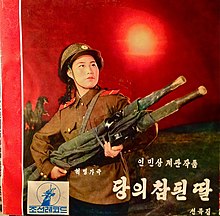A True Daughter of the Party (Korean: 당의 참된 딸; lit. To Truly become a Daughter of the Righteous Party) is a North Korean revolutionary opera.[1][2] First performed in 1971, it is credited to Kim Jong Il.[3][4][5]
| A True Daughter of the Party | |
|---|---|
| Korean revolutionary opera by Kim Jong Il | |
 Vinyl soundtrack of A True Daughter of the Party | |
| Native title | 당의 참된 딸 |
| Librettist | Kim Jong-il |
| Language | Korean |
| Premiere | 1973 |
| A True Daughter of the Party | |
| Chosŏn'gŭl | 당의 참된 딸 |
|---|---|
| Hancha | 黨의 참된 딸 |
| Revised Romanization | Dangui chamdoen ttal |
| McCune–Reischauer | Tangŭi ch'amtoen ttal |
The opera is considered one of the "Five Great Revolutionary Operas", a group of classical, revolution-themed opera repertoires well received within North Korea.[6][7] A True Daughter of the Party is the only one of the five set during the Korean War.[8]
It is performed with a male chorus, a smaller female chorus, with Western musical instruments, principally brass and strings.[9]
Plot
editDuring the Korean War, Kang Yong-ok serves in the Taebaek Mountains as a nurse for injured Korean People's Army soldiers as they fight against the American forces.[10]
Reception
editThe main theme, "Where Are You, Dear General?", is a paean to Kim Il Sung, credited to Kim Jong Il as composer; it was added to the opera by Kim Jong Il after he noted that A True Daughter of the Party was unpopular and that "the reason for its failure was that loyalty to the great leader was not brought into bold relief and that there was no suitable theme song."[11][12]
See also
editReferences
edit- ^ "Women of Korea". Working People's Organization Publishing House. March 19, 1974 – via Google Books.
- ^ "A True Daughter of the Party: The Revolutionary Opera". Foreign Languages Publishing House. March 19, 1974 – via Google Books.
- ^ Buzo, Adrian (September 13, 2016). The Making of Modern Korea. Taylor & Francis. ISBN 9781317422785 – via Google Books.
- ^ Breen, Michael (February 19, 2012). Kim Jong-Il, Revised and Updated: Kim Jong-il: North Korea?s Dear Leader, Revised and Updated Edition. John Wiley & Sons. ISBN 9781118153772 – via Google Books.
- ^ Nord, Sposare Oriente e Occidente: lo sviluppo dell’estetica operistica in Corea del; hookiisays, durante la Guerra Fredda- (April 15, 2019). "Marrying the East and the West: The Development of North Korea's Opera Aesthetic at the Height of the Cold War". JHI Blog.
- ^ Hudson, Dermot (August 16, 2018). VICTORY OF JUCHE KOREA IS A SCIENCE. Lulu.com. ISBN 9780244111540 – via Google Books.
- ^ Malice, Michael (January 25, 2014). Dear Reader: The Unauthorized Autobiography of Kim Jong Il. Michael Malice. ISBN 9781495283253 – via Google Books.
- ^ Marr, Henry (December 14, 2018). North Korea. Bradt Travel Guides. ISBN 9781784770945 – via Google Books.
- ^ Howard, Keith (January 24, 2020). Songs for "Great Leaders": Ideology and Creativity in North Korean Music and Dance. Oxford University Press. ISBN 978-0-19-007752-5 – via Google Books.
- ^ Howard, Keith (January 24, 2020). Songs for "Great Leaders": Ideology and Creativity in North Korean Music and Dance. Oxford University Press. ISBN 978-0-19-007752-5 – via Google Books.
- ^ "" suitable theme song. Then he advised that an" - Google Search". www.google.com.
- ^ "Korea Today". Foreign Languages Publishing House. March 19, 1991 – via Google Books.